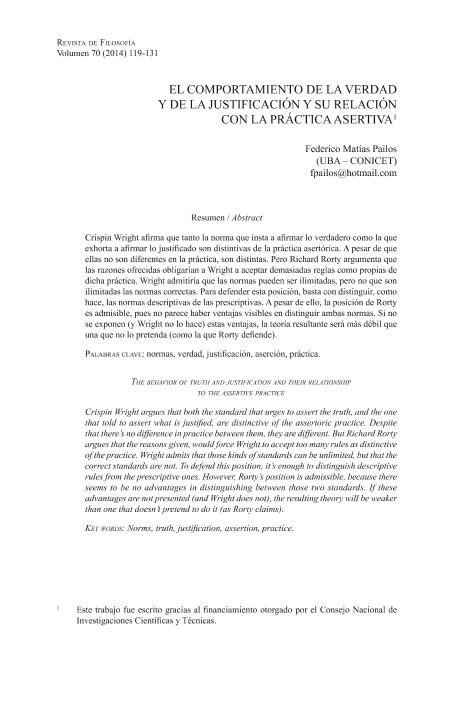Mostrar el registro sencillo del ítem
dc.contributor.author
Pailos, Federico Matias

dc.date.available
2018-07-02T18:28:16Z
dc.date.issued
2014-11
dc.identifier.citation
Pailos, Federico Matias; El comportamiento de la verdad y de la justificación y su relación con la práctica asertiva; Universidad de Chile. Facultad de Filosofía y Humanidades; Revista de Filosofía; 70; 11-2014; 119-131
dc.identifier.issn
0718-4360
dc.identifier.uri
http://hdl.handle.net/11336/50878
dc.description.abstract
Crispin Wright afirma que tanto la norma que insta a afirmar lo verdadero como la que exhorta a afirmar lo justificado son distintivas de la práctica asertórica. A pesar de que ellas no son diferentes en la práctica, son distintas. Pero Richard Rorty argumenta que las razones ofrecidas obligarían a Wright a aceptar demasiadas reglas como propias de dicha práctica. Wright admitiría que las normas pueden ser ilimitadas, pero no que son ilimitadas las normas correctas. Para defender esta posición, basta con distinguir, como hace, las normas descriptivas de las prescriptivas. A pesar de ello, la posición de Rorty es admisible, pues no parece haber ventajas visibles en distinguir ambas normas. Si no se exponen (y Wright no lo hace) estas ventajas, la teoría resultante será más débil que una que no lo pretenda (como la que Rorty defiende).
dc.description.abstract
Crispin Wright argues that both the standard that urges to assert the truth, and the one that told to assert what is justified, are distinctive of the assertoric practice. Despite that there’s no difference in practice between them, they are different. But Richard Rorty argues that the reasons given, would force Wright to accept too many rules as distinctive of the practice. Wright admits that those kinds of standards can be unlimited, but that the correct standards are not. To defend this position, it’s enough to distinguish descriptive rules from the prescriptive ones. However, Rorty’s position is admissible, because there seems to be no advantages in distinguishing between those two standards. If these advantages are not presented (and Wright does not), the resulting theory will be weaker than one that doesn’t pretend to do it (as Rorty claims).
dc.format
application/pdf
dc.language.iso
spa
dc.publisher
Universidad de Chile. Facultad de Filosofía y Humanidades
dc.rights
info:eu-repo/semantics/openAccess
dc.rights.uri
https://creativecommons.org/licenses/by-nc-sa/2.5/ar/
dc.subject
Normas
dc.subject
Verdad
dc.subject
Justificación
dc.subject
Aserción
dc.subject.classification
Estudios Religiosos

dc.subject.classification
Filosofía, Ética y Religión

dc.subject.classification
HUMANIDADES

dc.title
El comportamiento de la verdad y de la justificación y su relación con la práctica asertiva
dc.title
The behavior of truth and justification and their relationship to the assertive practice
dc.type
info:eu-repo/semantics/article
dc.type
info:ar-repo/semantics/artículo
dc.type
info:eu-repo/semantics/publishedVersion
dc.date.updated
2018-06-12T17:35:36Z
dc.journal.volume
70
dc.journal.pagination
119-131
dc.journal.pais
Chile

dc.journal.ciudad
Santiago de Chile
dc.description.fil
Fil: Pailos, Federico Matias. Universidad de Buenos Aires; Argentina. Consejo Nacional de Investigaciones Científicas y Técnicas; Argentina
dc.journal.title
Revista de Filosofía
dc.relation.alternativeid
info:eu-repo/semantics/altIdentifier/doi/http://dx.doi.org/10.4067/S0718-43602014000100008
dc.relation.alternativeid
info:eu-repo/semantics/altIdentifier/url/https://scielo.conicyt.cl/scielo.php?script=sci_arttext&pid=S0718-43602014000100008
Archivos asociados
